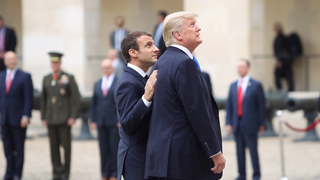The strained relations between the United States and its – primarily Western – European allies have been all too apparent over the past three years of Donald Trump’s presidency.
From trade disputes, disagreements on climate change policy, nuclear proliferation, and arms control, to name-calling and blame games, bickering among trans-Atlantic allies has become the norm. In fact, these days it seems the United States and its European allies are finding themselves more often pitted against each other than working together.
In fact, these days it seems the United States and its European allies are finding themselves more often pitted against each other than working together.
However, one policy area is offering prospects for cautious optimism in these relationships. The United States and Europe are increasingly converging in the diagnosis of security challenges emanating from the Asian continent and the bodies of water that surround it. In fact, the Indo-Pacific is finding its way into the strategic glossaries of Brussels and major European capitals as a nod to America’s pursuit of the Free and Open Indo-Pacific (FOIP).
French President Emmanuel Macron’s recent defence and deterrence speech was another example of this strategic re-focus, and a call for a greater investment of European resources. Despite the fact that the overall framing of the address repeated the now-standard tropes about the need to achieve European strategic autonomy, it underscored the importance France is placing on addressing the issues miring the Indo-Pacific, and reflected that some of the policy proclamations coming from Washington are gaining traction in Europe.
So far, both the Americans and Europeans have emphasised the commitment to preserving the rules and norms governing the maritime space in the Indo-Pacific, and have acted accordingly, albeit in significantly different orders of magnitude. Since the European Union hardened its stance towards China last year, an even greater potential to up those efforts and coordinate with the United States has presented itself.
Both sides of the Atlantic are equally concerned about protecting major energy and technological routes in the Indo-Pacific. Equally, there has been a common declaratory commitment to the protection of human rights in the region, even though there has only been limited action to back it.
However, moving forward with this cooperation is going to require reconciling the fact that while the United States and major European powers such as France might be diagnosing the same problems, their prescriptions to tackle those problems have often been far from similar.
Until 2021, and potentially longer if President Trump is re-elected, a fundamental incompatibility is emerging from their contrasting approaches to managing international security and the global economy. The Trump administration has reaffirmed its unilateralist bent, often rejecting the multilateral solutions that Europeans have traditionally preferred.
Moreover, the European Union is not just the sum of its parts, and despite the toughening approach to China at the level of its institutions, a number of its member states continue to advocate closer Sino-European ties. On top of this, if the FOIP and protectionist policies begin to look too much like containment, even more enthusiastic countries might grow more reluctant to get involved, for fear of being seen as blindly bandwagoning.
Most importantly, the ability to pool resources is contingent on the availability of the said resources. A major source of tension in the alliance stems from a divergence in policy preferences.
European states have traditionally been reluctant to prioritise ‘guns over butter’; something the incumbent US administration has been particularly fixated on.
Therefore, cooperation on specific security matters such as freedom of navigation patrols and capacity building in the Indo-Pacific will not only depend on the political will, but also on the availability of European resources. It will also most likely be based on bilateral or smaller multilateral agreements, with the likes of France and the United Kingdom leading the charge.
As long as President Trump remains in office, major frictions in cooperation will emanate from the obvious differences in the two sides’ approach to trade.
Having said that, there is still plenty of scope for functional cooperation on the development of regional infrastructure. The European Union’s Connectivity Strategy, American legislative initiatives such as the BUILD Act, as well as the trilateral Blue Dot Network between the United States, Australia, and Japan, are all complementary initiatives that can stimulate cooperation in the region.
Similarly, the two sides can achieve more coordination on a whole range of diplomatic initiatives in the Indo-Pacific. A stepped-up involvement in major regional frameworks and fora could be mutually beneficial, allowing the partners to set the agenda, provide greater legitimacy for particular policies, and help address major transnational issues and region-specific challenges.
Lastly, as long as President Trump remains in office, major frictions in cooperation will emanate from the obvious differences in the two sides’ approach to trade. As the US administration continues to pursue protectionist policies, sidelines multilateral institutions, and opts for bilateral trade agreements that might go against its European allies’ interests, tension is bound to build. This is a pity, as the two sides have plenty of common interests in addressing China’s unfair trade practices and in promoting trade flows in the Indo-Pacific.
The rest of 2020 is not poised to offer a lot of openings to deepen or accelerate cooperation between Europe and the United States in the Indo-Pacific. The tumultuous tail end of the electoral cycle in the United States combined with the first year in office of the new European Commission, which faces major internal issues, from its budget to Brexit, make for rather inauspicious timing.
However, even if the rate of progress is slow given the short-term uncertainties, the opportunities for cooperation are plentiful and real.




